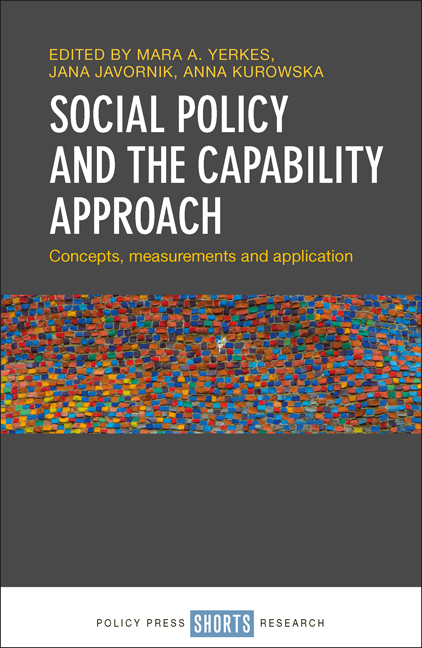Book contents
- Frontmatter
- Contents
- List of figures and tables
- Notes on the editors
- Notes on contributors
- one Rethinking social policy from a capability perspective
- two Education as investment? A comparison of the capability and social investment approaches to education policy
- three From ‘active’ to ‘capable’: a capability framework for policy and practice on ageing and later life
- four Converting shared parental leave into shared parenting: the role of employers and use of litigation by employees in the UK
- five Comparative social policy analysis of parental leave policies through the lens of the capability approach
- six Ask rather than assume: the capability approach in the practitioner setting
- seven Social investment, human rights and capabilities in practice: the case study of family homelessness in Dublin
- eight From the capability approach to capability-based social policy
- Index
five - Comparative social policy analysis of parental leave policies through the lens of the capability approach
Published online by Cambridge University Press: 30 April 2022
- Frontmatter
- Contents
- List of figures and tables
- Notes on the editors
- Notes on contributors
- one Rethinking social policy from a capability perspective
- two Education as investment? A comparison of the capability and social investment approaches to education policy
- three From ‘active’ to ‘capable’: a capability framework for policy and practice on ageing and later life
- four Converting shared parental leave into shared parenting: the role of employers and use of litigation by employees in the UK
- five Comparative social policy analysis of parental leave policies through the lens of the capability approach
- six Ask rather than assume: the capability approach in the practitioner setting
- seven Social investment, human rights and capabilities in practice: the case study of family homelessness in Dublin
- eight From the capability approach to capability-based social policy
- Index
Summary
Introduction
Parental leave as a social policy intertwines many intersecting policy domains such as family, employment, gender equality, demography, child wellbeing (Kamerman and Moss, 2011) and, in CA terms, parents’ and children's capabilities to be and do after childbirth (Javornik and Kurowska, 2017). It shapes the conditions under which women can access and engage with employment opportunities, men can access time off for parenting (also Leitner, 2003; Mandel and Semyonov, 2005) and children can access their right to be cared for by both parents (Javornik and Kurowska, 2017). While a growing body of literature examines parental leave in comparative perspective, equal impact of policies is assumed across different groups of parents (Javornik and Kurowska, 2017). For example, earlier comparative studies of leave policies do not comprehensively accommodate the socio-economic contexts and how these might affect the ways in which policy entitlements shape parent's real opportunities (see Chapter One) to use leave. In this chapter, we argue that, in order to understand real opportunities across countries, we need to account for external opportunities and constraints, that is, conversion factors (see Chapter One). At the macro level, these include cultural contexts and the socio-economic differences between countries.
We argue that leave policy design embedded in a particular context of conversion factors either exacerbates or reduces gender and income inequalities (for example, Gornick and Meyers, 2003; Ferrarini, 2006; Misra et al, 2010; Ciccia and Verloo, 2012). For this purpose, we analyse parental leave in ten European countries that represent different welfare state regimes, to analyse the extent to which national policies create opportunity structures that allow individuals to achieve valued functionings (see Chapter One) when they become parents.
In this chapter, we draw on our earlier work (Javornik and Kurowska, 2017) in which parental leave is operationalised as a social policy-derived means embedded in specific cultural and socio-economic contexts (Kurowska, 2018); these conversion factors condition an individual's capability to combine work and care, that is, to ‘be and do’ when they become parents. We focus on three interconnected valued functionings for the mother to continue to work after having a child; for the father to care for a child; and for the child to be cared for by both parents.
- Type
- Chapter
- Information
- Social Policy and the Capability ApproachConcepts, Measurements and Application, pp. 83 - 106Publisher: Bristol University PressPrint publication year: 2019



